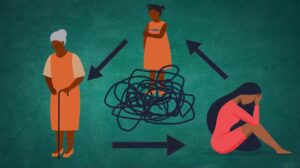Eye Movement Desensitization and Reprocessing (EMDR) Therapy is an approach adopted by Mental health professionals to help individuals navigate through the arena of Trauma predominantly. This is rising in use due to its enormous success rate amongst trauma survivors. This is largely because it has multiple goals that aim at enhancing the therapeutic outcomes of the therapy altogether.
EMDR helps seep through the challenges faced by individuals diagnosed with Post Traumatic Stress Disorder. EMDR uses eye movements to reframe the traumatic experience positively and to view the same past event with different lenses now. This does not happen overnight, it requires understanding and cooperation for sure.
EMDR stands out as a treatment entity for PTSD due to its unique features which includes its focus highly on the physical symptoms experienced during trauma. The major goal of this modality is to gradually diminish the RELIVING of the experience which is what happens with trauma making it problematic in the present since the trauma from years ago is probably wrapped up but your memory of it is not. This needs adequate processing to have a healthy closure and move ahead peacefully because there is always a possibility. You don’t have to trap yourself in your past, there is a fruitful life ahead which you very much deserve. EMDR treatment in India is gaining recognition as an effective approach to trauma recovery, with many individuals seeking EMDR therapy in India to address PTSD and other distressing experiences. EMDR treatment for trauma is especially on the rise since the uncertainties that we all lived through in different ways during COVID.
THE SCIENCE BEHIND THIS MAGICAL THERAPY
EMDR aims at resolving tragic experiences by working on the emotions attached to the experience along with the physical sensations felt along. This is a fascinating format since it focuses on the eyes and its link with memories and how that can be used effectively to recall essentially to redefine the experience now in the present moment.
EMDR therapists will work with you by asking you to follow their finger oscillations going back and forth to move your eye in the same direction. Simultaneously, you will be instructed to discuss your traumatic experience not in terms of the event itself but in terms of how you responded to it emotionally and physically.
EYE MOVEMENTS AND OUR MEMORIES
Rapid eye movements are used as the key element to help reprocess the trauma and desensitize the experience so, even if you come across similar events as your trauma, you will not feel triggered and bothered enough to relive the experience. For instance, you were a bully victim at school and growing up, you always feared making friends due to possible humiliation, your lack of eye contact with your peers and a hostile appearance reflects fear and not any signs of antisocial behavior as the underlying intentions differ.
EMDR will help fix this, so you can embrace your authenticity and live your life the way you wish to live slowly eliminating the unhealthy coping strategies or defenses, uncomfortable emotions, and physical sensations like racing heart to get yourself acquainted with the reality of facing your present without the fear of your past repeating itself.
Rapid eye movements (REM) are also a part of sleep and this is when we dream. REM sleep phase is accompanied with temporary muscle paralysis and high brain activity. This explains how there may exist an innate relationship between eye movements and the trigger of memories. EMDR utilises the same mechanism to create paradigm shifts in the originally negatively perceived events. EMDR treatment in India is gaining recognition as an effective approach to trauma recovery, with many individuals seeking EMDR therapy in India to address PTSD and other distressing experiences. EMDR treatment for trauma is especially on the rise since the uncertainties that we all lived through in different ways during COVID.
HOW DOES EMDR WORK PRACTICALLY?
For instance, a sexual abuse survivor may talk about how their vulnerability was exposed without their consent or with forced consent that inevitably led to them blaming themselves even though they are intellectually aware of it not being on their shoulders. This is more or less the main chunk of EMDR however, this is a structured process wherein the application is split into various stages to eventually bring the client to a state of being able to discuss their trauma comprehensively. The stages of EMDR involve the following phases:
- History taking of the traumatic event
- Preparing for self care through psychoeducation of how EMDR will be applied is essential to make the client aware of the potential emotional breakdowns that may occur proceeding ahead in this therapy
- Assessment of the intensity of the traumatic experience. Here, the therapist will guide you into identifying the event which you may have already briefly discussed in the initial sessions. Now, the therapist will help you to delve into what made it complex that you are having a hard time letting it go. This will involve the examination of the beliefs attached to that event, wherein you will put across the negative one like ‘I am worthless’ or ‘I am a failure’. Now, the therapist will encourage you to rephrase the same into a positive one like ‘It is not impossible to redefine my worth’ or ‘I am growing and making mistakes only make me more human’. Post this, there will be a scaling process wherein you will be requested to rate your level of disturbance experienced from 1 to 10 where 1 stands for no distress at all while 10 stands for very high distress.
After these stages, the next phases will revolve around ‘Reprocessing’ and ‘Desensitization’ of the traumatic event. Therefore, EMDR treatment in India is gaining recognition as an effective approach to trauma recovery, making it a cornerstone for trauma predominantly with many individuals seeking EMDR therapy in India to address PTSD and other distressing experiences. EMDR treatment for trauma is especially on the rise since the uncertainties that we all lived through in different ways during COVID.
Why CoachForMind?
- Experienced Psychologists: We are a team of licensed RCI-registered clinical psychologists. Our team is well-experienced in various forms of therapy such as CBT, DBT, Narrative Therapy, and EMDR Therapy for trauma.
- Personalized Approach: We are dedicated to treating our clients in the best-suited way, carefully curated as per the client’s needs, and adhering to one-on-one, client-centered therapy.
- Scientific Techniques: Our treatment plans and therapeutic methods are based on highly researched scientific findings such as CBT, DBT, and Narrative Therapy among many other therapeutic techniques used in art therapy counselling.
- Quality service: We at CoachForMind ensure quality services in our treatment regime and therapeutic approaches. Our clients hold most value to us, so we ground our techniques in empathy while maintaining professionalism.
For more information, please visit our website or contact us directly at coachformind@gmail.com




